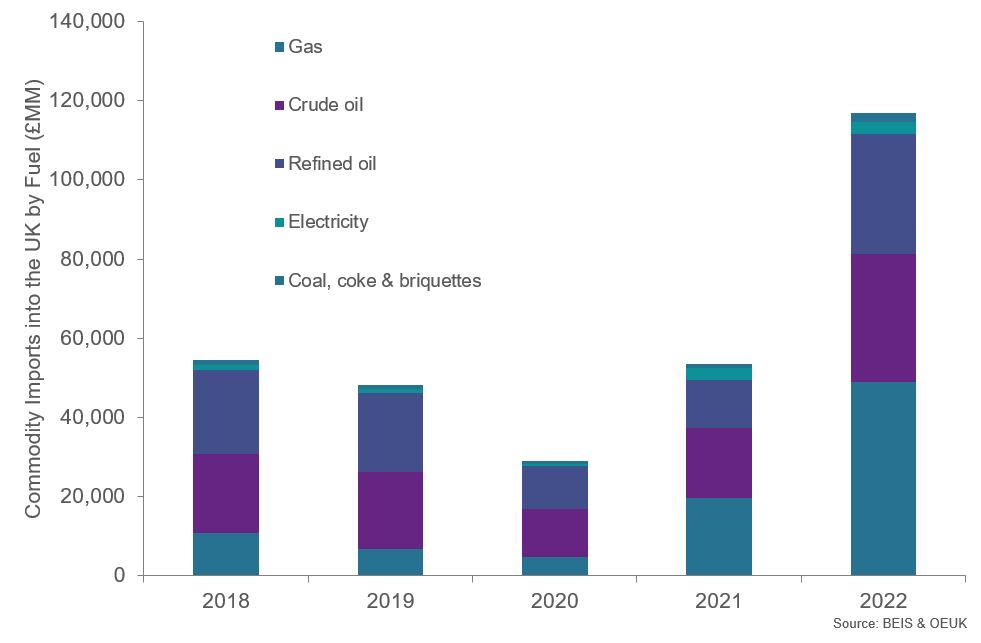March 22, 2023
The UK’s energy import bill surged to £117 billion last year – more than double 2021’s total of £54 billion, according to data in a new report from Offshore Energies UK.
It’s the first time UK annual energy import costs have broken the £100 billion barrier. OEUK’s Business Outlook Report, published on March 28, will warn that UK consumers and businesses could face similar import bills in this and future years – especially if the windfall tax imposed on UK oil and gas operators remains unmodified.
The cost equates to £4,200 per UK household, with the findings coming as MPs prepare for a Commons debate tomorrow (Thursday) on the UK’s ‘energy trilemma’, meaning the balance between energy security, costs, and environmental impacts.
OEUK’s report will say that the surge to £117 billion was driven partly by global price rises linked to the Ukraine conflict but also by inflation and higher worldwide demand after the pandemic.
The weakness of the UK economy and sterling was also a key factor because oil is valued in US dollars. The pound was worth up to $1.40 in 2021 but is now hovering around $1.20 – so each pound buys less.
In 2022 the UK spent about £63 billion on crude oil, petrol, diesel, and other oil-based fuels, with another £49 billion spent on buying gas. The rest was spent on imports of coal and electricity – making a total of £117 billion.
For comparison, in 2019, before Covid and Ukraine, the UK spent £48bn on total energy imports (equating to ~£1,700 per household). About £40bn went on oil and £7bn on gas. The rest went on coal and electricity. In 2021 energy imports cost £54 billion.
The figures were extracted from the latest data on the gross cost of commodity imports, just published by the UK government’s Office for National Statistics (ONS). The ONS data shows that energy imports from 𝗡𝗼𝗿𝘄𝗮𝘆 alone went from £13bn in 2019 to £41bn in 2022. The UK is now reliant on Norway for more than 30% of its gas.
OEUK’s report will warn that allowing the UK’s reliance on imports to grow further risks similar bills in this and future years – and will undermine the nation’s energy security as well as its economy.
It will also tell policymakers that, in a world where imported energy supplies are increasingly vulnerable to global supply and price shocks, the UK’s North Sea should be seen as the bedrock of the nation’s energy security. That means mainly oil and gas for now but expanding offshore wind and other low carbon resources for the future

The report will say: “The UK has been a net importer of energy since 2004, meaning that the country uses more energy than it can supply from domestic resources, so it relies on other countries to meet its energy needs.
“Being so reliant on other countries for our energy leaves the UK exposed to disruptions to supply, and volatility in international markets. Last year for instance the overall cost of fuel imports doubled to £117 billion.”
The report will also say that the UK’s North Sea still has oil and gas reserves equivalent to 15 billion barrels of oil – enough to support the nation’s needs for the three decades needed to build the offshore wind and other low carbon energy systems essential to power the future.
Ross Dornan, OEUK’s markets intelligence manager, who led the team that wrote this year’s Business Outlook report, said: “What these figures show is the risk and cost of relying on other countries for our energy security – and how far we are from reducing that reliance. About three quarters of the UK’s total energy comes from oil and gas – a proportion that has stayed constant for many years.

“We now rely on other countries for about half that supply, a proportion that will increase rapidly, especially if North Sea production is allowed to decline faster than UK consumption. The UK is on a three-decade journey to net zero and self-reliance but that needs long-term planning to reduce the demand for oil and gas.
“The UK has nearly 24 million homes heated by gas – which also fuels the power stations that provide 43% of our electricity. We also have 32 million cars fuelled by petrol and diesel. We can replace that infrastructure and those vehicles with low carbon alternatives, but it will take years during which we will still need oil and gas to keep our homes warm, keep the lights on and keep our roads moving.
“Our report argues that it will be better for our energy security and for the economy, to get as much of that oil and gas from our own North Sea as we can – rather than import it.”
David Whitehouse, OEUK’s chief executive, said: “The windfall tax levied last year, now means UK offshore oil and gas operators are paying a total tax rate of 75%, -one of the highest rates in the world and over three times the rate of conventional UK businesses. This level of tax discourages investment and undermines our companies, our jobs and our communities.
“As our Business Outlook report will show, many offshore operators are already cutting North Sea investment because of those taxes. That means oil and gas production will fall, we’ll lose skilled workers – and imports will have to increase to make up for the lost production.

“Almost 40% of our domestic and industrial energy needs are met by natural gas, and the North Sea basin and wider UK Continental Shelf provides close to half of that total. It is only because of this vital resource and our offshore work force that we are not reliant on Russian imports of gas.
“As a result of the war in Ukraine, we have seen a period of huge price volatility but when prices fall, the windfall tax should go. We have a great British energy industry of our own, but its future depends on moving back to a fair, balanced, and predictable tax regime and the continued issuing of exploration licences. “Otherwise, energy import bills exceeding £100 billion-plus will become a regular event – that’s money flowing out of UK homes and businesses to support the jobs, industries, and economies of other countries. The whole of the UK will be all the poorer for it. We surely cannot allow that.”
Share this article



